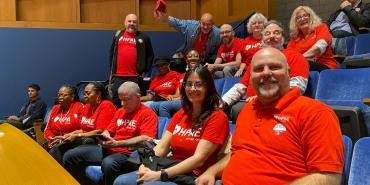On Oct. 27, several nurses representing the unsung heroes of the American healthcare system gave compelling testimony at a Senate Health, Education, Labor and Pensions (HELP) Committee field hearing in New Brunswick, N.J., on the national nursing crisis. The field hearing comes as nurses and other healthcare workers around the country stand together to demand that their hospitals establish safer staffing levels and put an end to the dangerous working conditions that jeopardize patient well-being, including 1,700 striking nurses at Robert Wood Johnson (RWJ) University Hospital in New Brunswick, who have been on the picket line since Aug. 4.
The hearing featured the testimony of nurse leaders, including Debbie White, president of the AFT-affiliated Health Professionals and Allied Employees in New Jersey and an AFT vice president. Their stories painted a vivid picture of the strain, stress and sacrifice that nurses endure daily, all while battling burnout and moral injury.
Sen. Bernie Sanders (I-Vt.), who is chair of the HELP Committee, articulated the importance of the nursing profession. “In my view, there are very few professions in America that are more important than nursing,” said Sanders. “We all know doctors and others play an enormously important role in healthcare system. But nurses are there when our babies are born … when we are dealing with very serious illnesses. And you were there providing the humane and compassionate care that every human being needs at the end of their lives. ... And we thank you.”
It's high time, he argued, that hospital executives showed these caregivers the respect and dignity they so deserve. Sanders also emphasized a pressing issue: the broken state of the American healthcare system. “We spend almost twice as much per capita as any other major country. ... We should have the best healthcare system in the world. But not only do we not have the best healthcare system, we are far behind other countries.”
Sanders noted that the U.S. falls short in terms of doctors, dentists, mental health practitioners and, most alarmingly, nurses. He attributed the shortage to insufficient investment in nurse educators and deplorable working conditions in hospitals.
“What nurses in New Jersey, Vermont and all over this country have told me is they have been stretched to the breaking point. They told me that they are stressed out, they're burned out and are leaving the profession they love in droves because they are overworked, undervalued, and forced each and every day to do more work with less resources,” he said.
Sanders wanted to hear both sides of the story, but the hospital's representatives who were invited to the hearing declined to attend. The senator said he would have posed tough questions. “I would have asked them how their healthcare system could afford to spend over $100 million on traveling nurses since the strike began but somehow cannot afford to mandate safe staffing ratios to improve the lives of patients and nurses at the hospital. I was also very curious to know how this nonprofit hospital could provide some $17 billion in CEO compensation for one person in 2021.”
Sanders also pointed out that the demands of nurses at Robert Wood Johnson are not radical. “All you're asking for is for this very large nonprofit hospital chain to mandate the same nurse-patient ratios that the state of California mandated some 20 years ago.”
Judy Danella, a staff nurse at RWJ Barnabas Health, and president of United Steelworkers Local 4-200, emphasized that the chronic understaffing by hospitals puts nurses in impossible situations, leading to demoralization and, ultimately, attrition.
“For safe staffing, we are no longer willing to be compliant to a broken system, where management puts profits over patients. The so-called nonprofit hospitals have more than enough money to invest in their workforce to ensure that we have safe staffing. Instead, again, they line their pockets with the excess profits that come from chronic understaffing,” said Danella.
AFT leading the way with Code Red
Debbie White, reflecting on the profit-driven nature of healthcare, lamented the allocation of hospital funds for flashy upgrades rather than staffing. She emphasized that hospitals will never voluntarily adopt safe staffing, and she called for state and federal legislation to force their hand. In New Jersey, HPAE, the United Steelworkers and every major healthcare union have been pushing the state Legislature to pass NJ-S304 in Trenton to mandate enforceable staffing ratios.
“In New Jersey, most of our hospitals have made tremendous profits, even during the pandemic. One would think then the primary focus for spending those profits would be on staffing, but hospitals are too often focused on adding a new fountain in the lobby and other aesthetics,” said White. “This employer should be embarrassed to tell the public what they've spent on replacement costs; they should be ashamed,” said White referring to RWJ.
White took a moment to highlight the AFT’s staffing campaign, Code Red, launched earlier this year to shed light on and resolve the country’s dire healthcare staffing crisis, which has resulted in safe staffing laws in Connecticut, Oregon and Washington. Healthcare staffing legislation was also introduced in several other state legislatures, including Alaska, New Jersey, New Mexico, Ohio and Wisconsin. Using the Code Red campaign as a guide, numerous AFT affiliates have concentrated on the issue of inadequate staffing, collaborating with more than 100 healthcare locals to improve staffing policy through collective bargaining and legislation. The campaign also aims to address staffing-related concerns such as workplace violence and recruitment and retention.
“Healthcare unions—we are leading the way, make no mistake about it,” said White. “We've all heard the slogan ‘safe staffing saves lives.’ It's true.”
Patricia Pittman, a professor at the Milken Institute School of Public Health at George Washington University noted that there's growing recognition that the nurse staffing crisis has largely been caused by attrition. Pittman's research highlights the root causes of the crisis: understaffing, poor working conditions, and the moral injury nurses suffer because they are not able to provide the care they believe patients need and feel they are powerless to make change.
The nurses’ firsthand accounts of inadequate nurse-patient ratios provided an unsettling picture of their daily struggles. They highlighted the constant juggling, the agony of knowing patients aren't receiving the care they need, and the sense of helplessness they endure.
Danella said, “When you go in, and you look at the board, and you see your patient assignment ... you say, oh my god, what is my day going to be like? Am I going to be able to give that patient the care they need?”
“I think the word that comes to mind for me is ‘anguish,’ ” said Carol Tanzi, a pediatric recovery room nurse at RWJ Barnabas Health. “You always have that feeling; it starts the night before your shift where you're just wondering what you're going to walk into,” she said. “We can't even go home and talk to our families, because they don't even understand what we're talking about. This kind of trauma is specific to us because we know what we suffer; and to this point, nurses have been afraid to talk about this to the general public, because we don't want to alarm anybody that it's scary in the hospital.”
“The worst part about this is watching the new nurses that I've precepted and mentored start practice, and every hour or so have to duck into the bathroom to cry, because they never expected to be so overwhelmed ... but this is the reality of our work,” said White.
These nurses are determined in their fight for better staffing and won't let intimidation or harassment stop them. Their stand is a sign of a broader movement that seeks to reshape the future of healthcare in the United States.
“They wanted to shame us and make us feel embarrassed … as if we were asking for more money; that was never the case. They are so terrified of us being organized that they literally were taking pages out of union-busting 101,” said Tanzi. The hospital wants the nurses to shut up and go back to work, she said. “That's not what we're doing. We're going to stand up and fight ... because this is too important.”
Spending millions on replacement nurses is “a horrible look for the hospital,” said White, adding that “it shows what hospitals are willing to spend their profits on. I think every hospital system is backing Barnabus in their actions right now, because they are terrified. They know nurses aren't going to take this anymore. And they see that these nurses ... are not willing to stand for the status quo, that you want to see real change,” said White.
At the conclusion of the hearing, Sen. Sanders reiterated that the purpose of the hearing was to address that staffing issue and to ensure that the nursing workforce is equipped to provide the care patients deserve. "We need strong staffing ratios to retain our nurses. That's what this is about, said Sanders. “At the end of the day, when you have nurses who have the time to take care of their patients, who feel good about their jobs, [they’re] not going to leave the profession. At the end of the day, everybody benefits: the hospital, the nurse and the patient.”
Watch the hearing at https://www.help.senate.gov/hearings/overworked-and-undervalued-is-the-severe-hospital-staffing-crisis-endangering-the-well-being-of-patients-and-nurses.
[Adrienne Coles]



